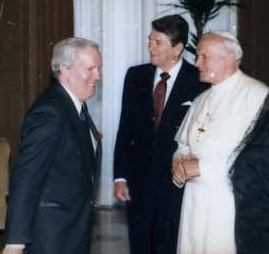Frank Shakespeare, who died today at the age of 97, was an old friend. I got to know him well when he served on the board of directors and I was a member of the program staff of Milwaukee’s Lynde and Harry Bradley Foundation. To honor and remember him, we republish the below article that originally appeared here on May 27, 2021.
I visited an old friend again last weekend.
On the drive out west from the Milwaukee area to see him, Frank Shakespeare, I thought of his and his colleagues’ service on the board of directors of The Lynde and Harry Bradley Foundation, where I was blessed to be able to work for about three decades. During those decades, I worked closely with Shakespeare, and we have kept up with each other. He was, as always, vibrant in conversation and warm in spirit.
During the past 12 months, sadly, two other board members whom my two Giving Review co-editors and I got to know when we worked there passed away, Reed Coleman and Pete du Pont.
Blessed, indeed. The manner in which Shakespeare, Coleman, du Pont, and their fellow board members engaged with each other, the foundation’s program and administrative staff, and its grant recipients and seekers was exemplary. Their commitment to the mission of the philanthropy, and the grantmaking program designed to achieve that mission, was clear. They listened, asked tough questions, and from all that, they learned.
While they certainly realized that Bradley’s grantmaking tenets aligned with their worldview—otherwise, they presumably wouldn’t be there—they knew the institution existed, legally and morally, for a public purpose and not personal ones. They chafed at top-down control, including from a board over staff or a funder over a grantee, aware of the typically damaging consequences of such.
It’s the ideas that should have the consequences, we all thought—I hope and think to good philanthropic effect. Maybe impactful, as some of you youth say.
Wise and, relatedly, humble
Every meeting and visit that I’ve ever had with Shakespeare in particular has always been full of animating ideas, of course, but also of common-sense analysis, with a clear set of options and a confidence in evaluating which ones to consider pursuing, as well.
[caption id="attachment_75864" align="alignnone" width="234"] Shakespeare and Schmidt in Wisconsin last weekend[/caption]
Shakespeare and Schmidt in Wisconsin last weekend[/caption]
Shakespeare has been a lot of things.
As president of CBS in the 1960s after being vice president of Westinghouse and RKO, Shakeshpeare was in on the “groundbreaking” of major entertainment and news media. He worked on messaging for Richard Nixon’s 1968 presidential campaign, including personally familiarizing the individual candidate with the television age, and served in the Nixon administration as director of the U.S. Information Agency.
President Ronald Reagan later named Shakespeare chair of the Board for International Broadcasting, where he helped widen the scope of Radio Free Europe/Radio Liberty to Eastern and Central Europe during the waning years of the Cold War. And he was U.S. Ambassador to both Portugal and the Holy See.
[caption id="attachment_75865" align="alignnone" width="269"]

Shakespeare, Reagan, and Pope John Paul II at The Vatican (Wikimedia Commons)[/caption]
In all of these roles, and in his at Bradley, Shakespeare well combined his intellect and his discipline. He brought a rare sense of what ideas, groups, and projects might have a possibility to transcend the moment, and thus potentially transform the era.
Shakespeare can certainly expound, of that there’s no doubt, and in that there’s much value. But he listens—gently, and intently. He is wise, and humble, and those are related.
Shakespeare is one of the few conservative “Wise Men,” as some peers of his era used to be called, who is still with us. We should be as willing to continue to learn from him as he has always so humbly been to learn from, and with, others.
To such good effect.
 Shakespeare, Reagan, and Pope John Paul II at The Vatican (Wikimedia Commons)[/caption]
Shakespeare, Reagan, and Pope John Paul II at The Vatican (Wikimedia Commons)[/caption]
 Shakespeare and Schmidt in Wisconsin last weekend[/caption]
Shakespeare and Schmidt in Wisconsin last weekend[/caption]